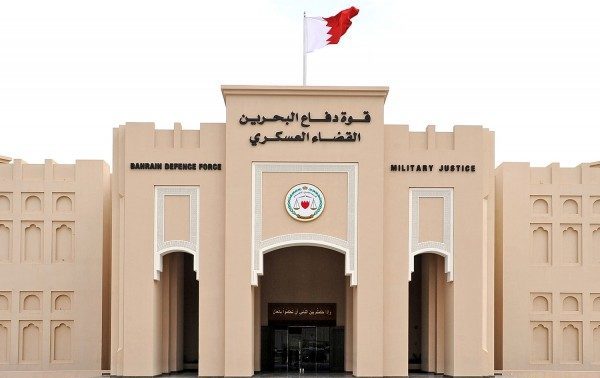Six civilians and one soldier convicted by the Military High Court of the Bahrain Defence Force (BDF) in December 2017 – civilians Sayed Fadhel Abbas Hassan Radhi, Sayed Alawi Sayed Husain Alawi, Mohammed Abdulhassan al-Mutaghawi, Mohammed Abdulhussain Saleh al-Shehabi, Mohammed Abdulwahid Mohammed al-Najjar, Hussain Mohammed Ahmed Shehab, and the soldier, Mubarak Adel Mubarak Mahanna – have appealed the ruling to Military Court of Cassation. On 26 March 2018, the Military Court of Cassation adjourned the appeal, which marks the defendants’ last chance for exoneration, to 11 April 2018 for the defense counsel to present oral arguments. These are the first civilians to be tried by the BDF court system following an April 2017 amendment to remove a constitutional prohibition on the practice, and the first civilians to be tried before any type of military tribunal since the temporary National Safety Courts of 2011.
The initial judgment came on 25 December 2017, when the Military High Court in Bahrain tried 18 men – 17 civilians and one soldier – on charges of forming a terrorist cell and plotting to assassinate the commander of the BDF, Bahrain’s military. The court sentenced six men, including Fadhil Alsayed Abbas Hassan Radhi, Sayed Alawi Sayed Husain Alawi, Mohammed Abdulhassan al-Mutaghawi, and Mubarak Adel Mubarak Mahanna, to death with an additional 15-year prison term. It sentenced seven other defendants, including Mohammed Abdulhussain Saleh al-Shehabi, Mohammed Abdulwahid Mohammed al-Najjar, and Hussain Mohammed Ahmed Shehab, to seven-year prison terms. The 13 men who received convictions were also stripped of their nationality, while the remaining five defendants were acquitted.
On 21 February 2018, Bahrain’s Military High Court of Appeal confirmed the death sentences against Mubarak Adel Mubarak Mohanna, Sayed Fadhel Abbas Hassan Radhi, Alsayed Alawi Hussain Alawi Hussain, and Mohammed Abdulhassan Ahmed al-Mutaghawi following several postponements of the case. The Military High Court of Appeal rejected an appeal from the Military Prosecution that sought to overturn the five acquittals, and suspended another appeal from the Military Prosecution to alter the in absentia verdict of five defendants who are not in government custody. Additionally, it accepted the appeal of two defendants – Hussain Mohammed Ahmed Shehab and Mohammed Yussef Marhoon al-Ajmi – and reduced their prison terms from seven years to five, but rejected a similar appeal from two other defendants – Mohammed Abdulhussain Saleh al-Shehabi and Mohammed Abdulwahid Mohammed al-Najjar – confirming their seven-year sentences.
Bahrain’s use of military courts to try civilians is in violation of the fair trial rights enshrined in both the Universal Declaration of Human Rights (Article 10) and the International Covenant for Civil and Political Rights (Article 14). In addition, it contravenes the spirit of the Bahrain Independent Commission of Inquiry recommendations, which stated in Recommendation 1720 that “fundamental principles of a fair trial, including prompt and full access to legal counsel and inadmissibility of coerced testimony, were not respected” by Bahrain’s military tribunals, and that such cases should be subject to civilian review. The government’s actions also explicitly violate recommendations that Bahrain accepted as part of its United Nations Universal Periodic Review process, which variably called on the authorities to ensure that civilians are never again tried in military courts.
Compounding the illegality of trying civilians before military courts, both the initial and appeal proceedings have been rife with other due process and human rights violations. Several defendants report that officials tortured them to extract confessions and that they are being held in military rather that Ministry of Interior facilities, which would mark the first time the BDF has been directly implicated in domestic policing and physical violence against civilian detainees since 2011. Additionally, some of the men – like Sayed Alawi and Fadhil Abbas Radhi – were also subjected to enforced disappearance. Eight defendants were convicted in absentia, as they had reportedly fled to Iraq and Iran, and at least two were minors at the time of the alleged offense or arrest. The court additionally “issued a decision banning the publication of any information, data or news by any audio-visual, electronic or written media.” In the initial trial, the authorities also prevented some defendants from meeting with a lawyer until the third hearing in November 2017.
Bahrain’s use of military trials for civilians is in blatant violation of international standards. The government must immediately void the verdicts, repeal the constitutional amendment, and release the detainees, ensuring that any future trials are conducted by civilian courts in accordance with international law. Furthermore, with the BDF’s clear return to domestic policing and political repression, Bahrain’s leading military partners – such as the United States – must suspend all security assistance and cooperation until the military has been barred from trying civilians and is investigated for its involvement in severe human rights abuses such as torture.
Monica Zuraw, Advocacy Intern





